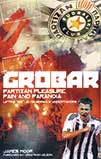 Partizan pleasure, pain and paranoia
Partizan pleasure, pain and paranoia
by James Moor
Pitch Publishing, £12.99
Reviewed by Marcus Haydon
From WSC 322 December 2013
The collapse of communist-era structures had a profound effect on football in central and eastern Europe, but the ethnic wars in the former Yugoslavia created even deeper fault lines. Modern-day Serbia, which was home to Europe’s best team 22 years ago, now has the continent’s 25th best (or 29th worst, depending on your perspective) league according to the UEFA coefficients. Its historic powers, Partizan and Red Star Belgrade, perpetually battle for supremacy in a competition whose numbers are topped up by minnows from the country’s provinces and capital’s suburbs.
With the competitiveness of the Yugoslav era gone, the corruption and off-field problems that blight the game seem to carry added importance. Clubs are no longer arms of the state but continue to be exploited for political and commercial reasons. On the terraces xenophobia is a persistent issue, leading to attacks founded on race or, as is more common in this part of Europe, ethnicity. For James Moor, an Arsenal fan posted in Belgrade by the Foreign Office, football presented him with a conduit through which to observe and attempt to decode Serbia’s complexities. Initially it is his way of making local friends – it is they who are responsible for his allegiance to Partizan – but it ends up taking him across the country to experience firsthand the varied ethnic tapestry and supporter culture.
The book is presented chronologically, following Partizan during a season in which they are eliminated from the Champions League qualifiers by Shamrock Rovers, lose three times to rivals Red Star, sack their management team mid-season and see their two main supporters’ groups at constant loggerheads. Oh, and they win the league. Taking his posting seriously, Moor engages quickly with the country and its language, and while his anecdotes about watching Arsenal title successes on television and a clumsy description of the “English Championship League One” can leave you suspicious of his credentials, he makes up for it in the context of his new surroundings with a strong awareness of regional history and contemporary politics. A trip to Novi Pazar, where the population has a Bosniak (Slav Muslim) majority, is carefully framed with valuable non-footballing context and his detailed translations of chants, banners and terrace conversations add cultural currency to what are otherwise just descriptions of Serbian league matches from two years ago.
Despite making a living from diplomacy, Moor manages to avoid the occupational trait of using a great number of words to say very little of note on complex or controversial issues. Equally, he is also not guilty of simply feeding the reader polemics from his terrace acquaintances without first coupling them with some objective analysis of his own. The prose can at times get drawn a little too much into the “banter” of the matchday experience – a questionably large number of things are “awesome” – but the enduring feeling is that it’s heartening to see work such as this published.
As Jonathan Wilson points out in the foreword, this is essentially “a book about the second most famous team in Belgrade” and, accordingly, both Moor and his publisher deserve great credit for bringing it to print at all. Hopefully the knowledge and insight offered in this example will inspire more publishers to show similar faith.